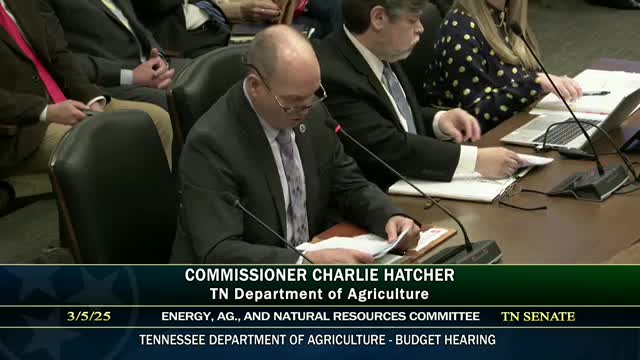Tennessee Agriculture Department presents $66M budget proposal for key programs
March 05, 2025 | Energy, Agriculture and Natural Resources, Senate, Committees, Legislative, Tennessee
This article was created by AI summarizing key points discussed. AI makes mistakes, so for full details and context, please refer to the video of the full meeting. Please report any errors so we can fix them. Report an error »

The Senate Energy, Agriculture, and Natural Resources Committee convened on March 5, 2025, to discuss the budget proposals and challenges facing Tennessee's agricultural sector. The meeting focused on funding increases for various agricultural programs, as well as the implications of potential trade tariffs on the state's farmers.
The session began with a presentation outlining proposed budget increases for the year 2025. The Ag Enterprise Fund was highlighted as a key initiative, with a proposed recurring increase of $15 million, noted for its strong return on investment. The Tennessee Ag Enhancement Program, recognized as one of the best producer cost-share programs in the nation, is set to receive an additional $5 million. Another significant proposal is the Farmland Conservation Fund, which seeks $25 million for permanent conservation easements aimed at preserving family farms.
Additionally, the committee discussed the need for funding related to meat inspection administration, with a proposed budget of approximately $1.87 million. This initiative aims to establish a state meat inspection program that aligns with federal standards, potentially enhancing branding and value for small processors.
The meeting also addressed funding for 4-H and FFA capital projects, each proposed at $46.25 million. These programs are vital for workforce development and leadership training in agriculture and forestry.
As the discussion progressed, the committee reviewed a SWOT analysis that highlighted strengths such as record investments in rural communities and the importance of services provided to farmers. However, challenges were also identified, including the impact of new tariffs on the agricultural sector, which could lead to short-term pain for long-term trade benefits.
Senator Campbell raised concerns about the anticipated effects of these tariffs, noting that farmers are often the first to feel the impact when commodity prices drop. The committee acknowledged the need for proactive measures to mitigate these challenges.
The meeting concluded with a focus on the importance of transition planning for aging farmers and the need for improved agricultural infrastructure in Tennessee. The committee expressed a commitment to addressing these issues as they move forward with the proposed budget and initiatives aimed at supporting the state's agricultural community.
The session began with a presentation outlining proposed budget increases for the year 2025. The Ag Enterprise Fund was highlighted as a key initiative, with a proposed recurring increase of $15 million, noted for its strong return on investment. The Tennessee Ag Enhancement Program, recognized as one of the best producer cost-share programs in the nation, is set to receive an additional $5 million. Another significant proposal is the Farmland Conservation Fund, which seeks $25 million for permanent conservation easements aimed at preserving family farms.
Additionally, the committee discussed the need for funding related to meat inspection administration, with a proposed budget of approximately $1.87 million. This initiative aims to establish a state meat inspection program that aligns with federal standards, potentially enhancing branding and value for small processors.
The meeting also addressed funding for 4-H and FFA capital projects, each proposed at $46.25 million. These programs are vital for workforce development and leadership training in agriculture and forestry.
As the discussion progressed, the committee reviewed a SWOT analysis that highlighted strengths such as record investments in rural communities and the importance of services provided to farmers. However, challenges were also identified, including the impact of new tariffs on the agricultural sector, which could lead to short-term pain for long-term trade benefits.
Senator Campbell raised concerns about the anticipated effects of these tariffs, noting that farmers are often the first to feel the impact when commodity prices drop. The committee acknowledged the need for proactive measures to mitigate these challenges.
The meeting concluded with a focus on the importance of transition planning for aging farmers and the need for improved agricultural infrastructure in Tennessee. The committee expressed a commitment to addressing these issues as they move forward with the proposed budget and initiatives aimed at supporting the state's agricultural community.
View full meeting
This article is based on a recent meeting—watch the full video and explore the complete transcript for deeper insights into the discussion.
View full meeting
